Here at the Business School of Renmin University of China (RMBS), we offer our students 3 very different MBA programs:
- 1. International MBA (IMBA);
- 2. Part-time Chinese MBA; and
- 3. FinTech MBA
The Master of Business Administration (MBA) program targets professionals with several years of work experience and significant potential to become high-performing executives. RMBS’ MBA graduates typically assume a middle-to-senior management or consultant position in a broad array of industries. As a special stream of the MBA program, the IMBA program delivers all courses in English and accepts students from both China and overseas. The Part-time Chinese MBA program is designed for mid-career Chinese managers who prefer to work during week-days and study during weekends. As part of the MBA program, the FinTech MBA, the first of its kind in China, is launched to cater to the growing demand for FinTech professionals.
Each program is unique in its own way but all are 2-year long programs. Students from every program have opportunities to network and engage with each other throughout their studies here at RMBS.
Discover which one is the perfect fit for you!
-
5 Global Career Experiences You'll Gain From An MBA In China
5 Global Career Experiences You'll Gain From An MBA In China
If you’re an ambitious person with an interest in global business matters, and an urge to pursue a truly international career, an MBA in China might be for you.
Beijing, the nation’s capital, is a thriving business hub that’s brimming with rich cultural history. While it’s home to world famous landmarks such as Tiananmen Square and the Forbidden City (the National Palace Museum), it’s also the base for global interactions across politics, business, and economics.
Here are five global career experiences you could gain from an MBA in China:
1. Learn alongside local and international students
It’s commonly believed that the learnings you gain from your peers at business school are as important as those you gain during MBA classes.
Fabiola Ivitha ANG, a second-year MBA student originally from Indonesia, was determined to find an MBA program with a mix of international and domestic students.
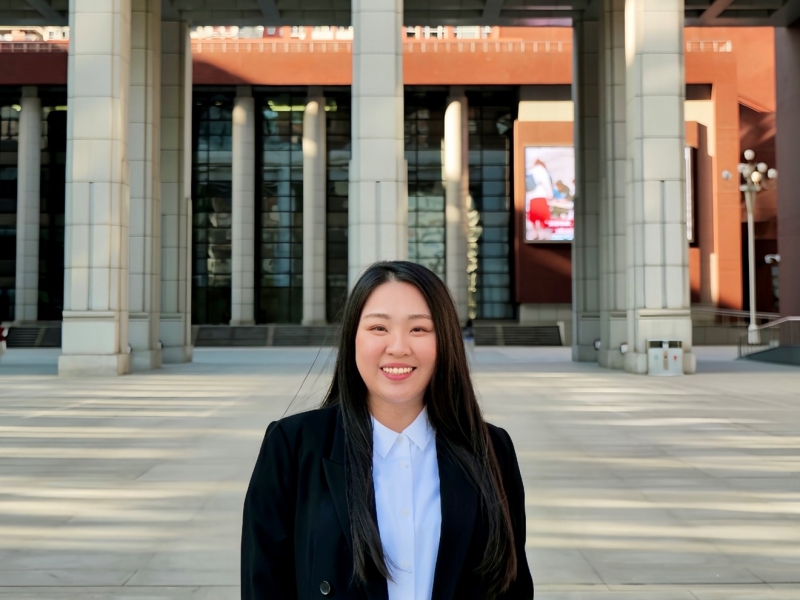
She had studied hotel management but wanted to develop her leadership skills and was immediately attracted to the idea of business school in China due to the country’s rapid economic growth.
“Indonesia has a good relationship with China,” she says. “I wanted to better understand the Chinese market and culture—an MBA presented the opportunity to gain exposure to the dynamic and diverse market in China.”
Her research, which included reading articles on websites such as BusinessBecause, led her to the Full-Time International MBA (IMBA) at Renmin University of China’s Renmin Business School in Beijing.
The Renmin MBA is comprised of 80% domestic students and 20% international students. Some of the nationalities represented include the US, Uganda, Pakistan, and South Korea.
2. Learning about business with global business schools
As a member school of the Global Network for Advanced Management (GNAM), Renmin Business School offers Global Network Week (March), Global Network Courses, and other global network events. These include various competitions, study camps, and networking opportunities.
The Global Network Courses are programs that allow students to attend online courses with overseas business schools.
These schools include Yale School of Management, HEC Paris, and the National University of Singapore.
“There are lots of opportunities to meet people from diverse backgrounds in these short online network courses,” says Fabiola.
Fabiola joined Renmin in 2022 and one of her favorite courses so far is Global Management, which is a Global Network Course offered by Renmin Business School and open to both Renmin MBA students and GNAM member school students.
The course invites students to consider company case studies and reflect on how to improve the business plan and strategy of such firms.

3. Pursuing internships with multinational companies
Many students find their post-MBA job through MBA internship opportunities. Even if the internship doesn’t lead to a job, it’s a great way to build your global business network.
Fabiola has completed an internship with a social media company in Beijing called Kuaishou Technology. During her time there she acted as a consultant by analyzing scripts and trends of videos made by content creators on the Chinese social media app, which also has platforms in Brazil and Indonesia.
Fabiola has an interest in social media, with ideas to create her own social media app that she could launch in Indonesia.
“Now that I’ve interned with a social media app, I have a better understanding of how it all works.”
Fabiola (pictured): Lijingmen Scenic Area, Luoyang, Henan Province
4. Immersion in competitions
Competitions at business school are not just about putting your knowledge to the test, these events can help you improve your communication and strategic thinking skills.
Renmin Business School offers competitions such as the National 'Peak Time' Business Simulation Competition, the Beijing College Students Innovation and Entrepreneurship Competition, and the China Brilliant Global (CBG) Cup Management Case Competition, where teams of students compete to apply management ideas and practices to given enterprise case studies.
During the International MBA, Fabiola has participated in the Yale Stock Trading Game, which teaches the fundamentals of trading and markets.
“It allowed me to meet international students from Yale and other universities and experience how other students are thinking about the game,” she says.
Renmin MBA students can also attend competitions offered by GNAM member business schools such as the IE Business School Global Innovation Competition, the Yale Investment Competition, and the University of Oxford 'Map the System' Social Innovation Competition.
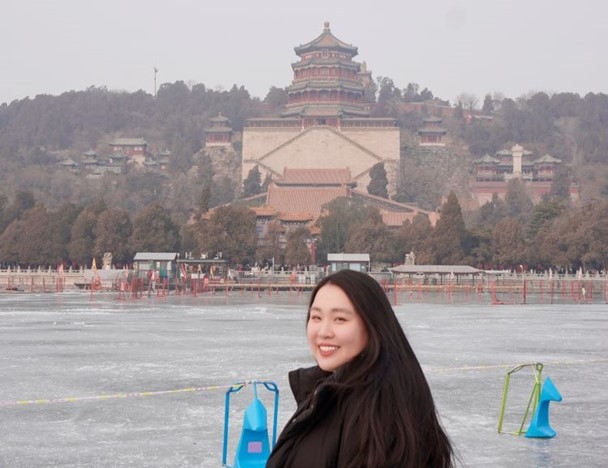
Fabiola (pictured) outside the Summer Palace
5. Access to recruitment events with global companies
Business schools that offer global MBA programs usually have strong links to top companies.
Graduates from the Renmin IMBA land jobs with companies such as the China Development Bank, Accenture, ByteDance, and Ernst & Young (EY).
As part of the IMBA, Fabiola has been on a corporate visit to JD.com—the largest retailer in China.
“We had a workshop where they challenged our way of thinking,” she says.
Haidian district, where Renmin is based, is known for its entrepreneurial climate and is home to an abundance of companies in the information technology industry.
“There are so many major companies located in Beijing, which provides an open forum of networking and insight,” she says.
She also enjoys the vibrant atmosphere and rich cultural heritage that the city has to offer.
As an international student in China, Fabiola is continuing to improve her Mandarin language skills, which she says is important for immersing herself in the Chinese culture.
“As China becomes more dominant in Asia, studying a business degree in China is going to be an important part of expanding your business network,” she concludes.
-
Why An MBA Is Your Ticket To Jobs In China
Why An MBA Is Your Ticket To Jobs In China
Find out how an MBA can help you unlock jobs in China
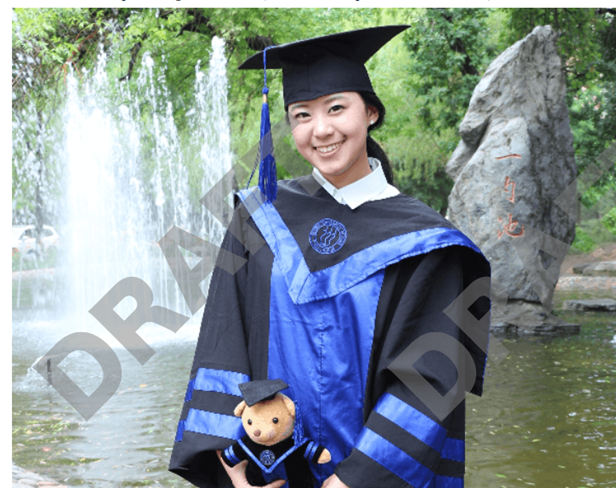
For any international businessperson, finding jobs in China can be a daunting prospect—where do you even begin?
If you want to launch your career there, it's important to grow your network first and secure as much experience of Chinese culture as you can. That's according to Ugur Kilicarslan and Eive Suthichitranout, two graduates from the International MBA program at Renmin Business School in China.
Students on Renmin’s IMBA are given mandatory classes in Mandarin as well as Chinese history and culture. These components are designed to allow for an easier transition into China’s work environment.
Both graduates cite the opportunities available within the program––work experience, mentor programs, and business simulations––as playing a big part of placing them in stronger positions after graduating.
Building bridges between China and the rest of the world
Ugur was an inspector for the undersecretary of Turkish foreign trade to the commercial councilor for the Republic of Turkey, in Bejing, when he joined the MBA at Renmin. He emphasizes that the degree was a key part of his career progression.
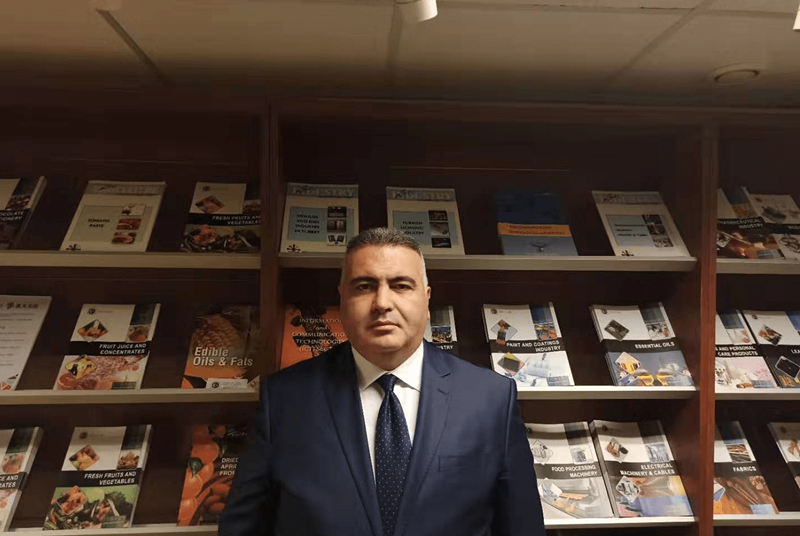
He says the improvements he has made in his approach to business interactions led to a promotion to his current role, as commercial councilor of the Republic of Turkey, in Beijing.
“My main responsibility now is to increase trade volume between Turkey and China, and to promote investment opportunities between our countries,” he explains.
“China is a dominant player in global trade and has had a huge impact on the global economy. You can’t fully understand world GDP growth since 2000 If you don’t look at the Chinese economy. I chose to study in China for a better understanding of the world economy and its future.”
To help develop his skillset around international relations, Ugur says the Project Management and Business Communication modules on the IMBA course have been the most useful to him.
“I have seen an improvement in my business communication skills,” he says. “Understanding the culture has been beneficial to my career.” By using his more fluid understanding of the culture across each province in China, he says he has been better able to navigate investment negotiations between Turkey and China as a result.
The benefits of learning about Chinese culture
As well as exploring her Chinese ancestory, Thai native Eive Suthichitranout says that building relationships with her classmates during her time studying at Renmin has left her in a strong position to move forward in her career.
 Beyond business, she says the opportunity to fully immerse herself into the culture and to travel around the different provinces has given her a clearer understanding of the country and how it operates.
Beyond business, she says the opportunity to fully immerse herself into the culture and to travel around the different provinces has given her a clearer understanding of the country and how it operates. Her MBA has also helped her more practically, particularly when looking at managing international production and marketing. Thinking long-term, Eive wants to use her MBA to build her own business into the Chinese ecosystem, rather than simply find a job in a corporation.
As the director of her family-run manufacturing company, Eive has big plans for expansion. Using her new contacts, which she formed on the course, she says she wants to break into the manufacturing market in China. One of her classmates will be working with her to build a factory to ensure this happens.
“We currently have some suppliers and customers in China, so it makes sense,” Eive says.
Why there are jobs in China for international talent
China remains at the forefront of innovation, particularly in e-commerce and technological innovation. Wherever there's a need for fresh innovation, there's demand for new talent, making China a breeding ground for opportunity.
So why is there an assumption China’s business ecosystem is difficult for internationals to access? Eive didn't think she would be able to make a success of her business expansion if she didn't have the backing of her MBA, due to the lack of exposure to the Chinese network––one which she says can seem impenetrable if you don't know the right people.
It's true that experience can be hard to come by if you do go it alone, which is why MBA programs in China and the wider Asia-Pacific region have seen a year-on-year rise in application volume. According to the Graduate Management Admission Council (GMAC), business schools in the Asia-Pacific saw international applications increase by over 15% between 2017 and 2018.
This display of growth is the polar opposite to the decline in international applications suffered by business schools in the US, as more students head East instead of West.
Ultimately, businesses in China aren’t just looking to hire students with good grades. They want innovative and forward-thinking candidates who are immersing themselves in the Chinese culture and business world.
That, say Ugur and Eive, is what an MBA can give you.
-
How A Business School Competition Set Me Up For A Career In Investment Banking
How A Business School Competition Set Me Up For A Career In Investment Banking
Guo Xiangyu won first prize in a global investment competition at business school. Now, he says investment banks want to hire him
The Big Six beat 24 teams in the Global Network Investment Competition this year
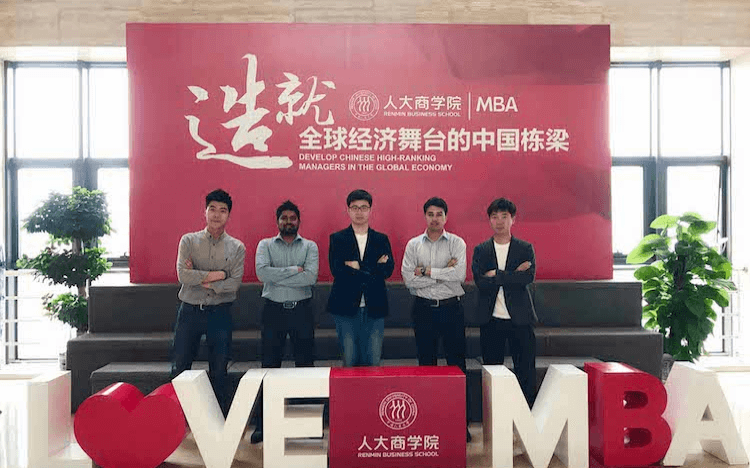
Guo Xiangyu knows investing.
He knows investing so well that he received an early promotion while working as a financial analyst for a securities company in Beijing, China.
He spent just over three years researching listed companies for Guoyuan Securities and recommending them to fund managers, perfecting his skill for spotting well-performing stocks.
One year later, that knowledge is what helped him and his team, the Big Six, win the annual Global Network Investment Competition as International MBA (IMBA) students at the Business School of Renmin University of China.
The six-month competition held by the Global Network for Advanced Management—a collaboration of business schools where Renmin is one of the only two member business schools from Chinese mainland universities—pits teams of students against one another. The aim of the game is to achieve the best return on a selected portfolio of stocks.
Guo says the competition has not only enhanced his confidence in his abilities, it’s also helping to boost his career in investment banking and bringing him closer to his long-term goal of launching his own private equity business.
________________________________________
How does a global investment competition work?
To be a successful investor, Guo says you need to be able to identify high-potential companies and ascertain their future performance. For Guo, holding a bachelor’s degree in finance and a master’s degree in economics, gave his team an advantage in the investment competition.
When it came to building a portfolio to run against the country’s capital-weighted stock market index and analyzing these stocks, the Big Six’s plan proved foolproof.
With the help of Renmin’s professors, the team built a model to filter out underperforming companies out of the 1000 listed on the Shanghai Stock Exchange Composite Index. They then whittled the 99 stocks that remained down to the top five. Investment management firm, M&G, was chosen as their main stock.
Competing against 24 teams from business schools from 15 countries, the Big Six come out on top with a return on its portfolio that was 28.67% better than the Shanghai Stock Exchange.
They analyzed the financial statements of M&G, then concluded their report together, with Guo taking the lead and working late into the night. After five drafts, they finished it!
Alongside Guo, Korala Mudiyanselange Roshan Malindha, a professor of statistics before joining Renmin; Wei Qiang, who worked in advertising before his MBA; Wang Lu, a former car designer; and Abiral Khatri, a Renmin IMBA 2020 candidate, made up the Big Six.
________________________________________
Why should you get involved?
Guo says that balancing and winning such an intense competition with an IMBA workload was challenging for himself and his team, but the efforts have proved to be rewarding.
The Big Six won $3,500 for their first-place finish but more importantly, Guo says, they became lifelong friends. “The competition has become such a valuable memory which I believe all the team members will value through our lives,” he says.
The team’s instructor Barry Gunderson, who teaches financial markets and behavioral finance at Renmin, met the team a month before the final project’s submission date and says that they had already established their plan.
As Renmin is a member of the 30-school strong Global Network for Advanced Management, Barry says the connections students make help them in their future careers.
“It’s very useful working cross-culturally and using the fundamental skills for financial analysis. All of those things are going to provide an additional foundation for success once the students enter the workforce again,” he says.
Guo agrees. The competition, he says, has helped him stand out in the job market.
“It’s difficult to find an internship in an investment bank nowadays in China. But once I mentioned this award in my resume, I got the job interview opportunity almost every time.”



